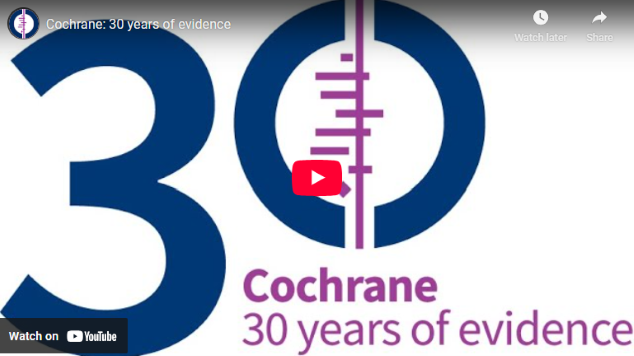Cochrane was established in 1992 in Oxford, UK 'to facilitate the preparation of systematic reviews of randomized controlled trials of health care.'
The Cochrane Centre, as we were then known, formalized an international collaboration that had carried out groundbreaking work during the 1980s to prepare systematic reviews of controlled trials in pregnancy, childbirth and the neonatal period.
We took our name from Scottish medical researcher Archie Cochrane, whose experiences as a doctor with scarce resources during the Second World War influenced his views on health care. Cochrane pioneered the equitable use of resources for treatments that had been reliably proven to be effective. Read more about Archie Cochrane.
Our ten founding principles were highly progressive at the time, and remain the cornerstone of our work today: collaboration; building on the enthusiasm of individuals; avoiding duplication of effort; minimizing bias; keeping up to date; striving for relevance; promoting access; ensuring quality; continuity; and enabling wide participation.
Since then, we have vastly expanded our systematic reviews and supporting health evidence. Today there are Cochrane Groups in most countries, and we provide reliable health information on hundreds of topics to individuals and institutions around the world. We focus on where the need for reliable evidence is greatest, to bring benefit to as many people as possible. Watch the video below to find out more about the evolution of Cochrane.
Since its creation in 1993, Cochrane has become a global gold standard for evidence-based health due to its ability to provide rigorous information for professionals and health systems around the world, making this project worthy of all our support.
Alberto Merchante-González, Chief of Public Health, Spanish Ministry of Health
Video: Cochrane - 30 years of evidence (5 mins 33s)

Video transcript
Narrator: In 1993 an international group of health researchers, providers and consumers gathered in Oxford in the UK to organize a collaborative approach to improve healthcare research and practice.
Iain Chalmers, Former Director, UK Cochrane Centre: We left people in no doubt at all that if this was going to be done, it needed international collaboration. We had demonstrated with the model of the perinatal work that it was possible to do it. We needed to get in touch with all of our allies around the world and to say, "Are you up for this?"
Narrator: They were motivated by principles set forward by Archie Cochrane that highlighted using reliable evidence that has been systematically evaluated.
Iain Chalmers: He asked the question, “How can we have a rational health service if we don’t know which of the things being done within it are useful and which are useless or possibly even harmful?”
Narrator: Over the decades that followed, this international network of collaborators would improve and evolve methods of meta-analysis to systematically gather and review randomized control trials with the goal of synthesizing the best evidence for health outcomes.
Gill Gyte, Consumer Editor, Pregnancy and Childbirth Group: It was actually all about only using interventions when they were effective, and it proved that a lot of the routine interventions that had been around before actually just didn’t work or had adverse effects. And so they eventually were stopped. Routine shaves, routine enema, routine episiotomy, they’re all gone now.
Narrator: The Cochrane logo is an example of one systematic review that demonstrated a benefit of treatment, in this case corticosteroids saving the life of premature infants, including George Selby.
George Selby: I think of hope.
Rebecca Selby (George's mother): Aw, bless you.
Paul Selby (George's father): Why hope?
George Selby: Because it gives me hope for the future outcomes.
Narrator: Cochrane is now an independent international network with members and supporters from more than 190 countries.
Jimmy Volmink, Founding Director, South African Cochrane Centre: We made it a very clear goal that we would prioritize the conditions that are important to Africa. We have, together, been able to substantially increase the number of reviews that are relevant to Africa.
Narrator: Cochrane Review Groups have produced over 16,000 new and updated Cochrane reviews over a wide range of disciplines. These have led to health policy changes that have saved and improved lives around the world.
Cindy Farquhar, Co-Director, Cochrane New Zealand: When I go to international meetings on obstetrics and gynaecology, without a doubt people are quoting Cochrane reviews, probably in every presentation on evidence or what’s best practice or guidelines.
Narrator: Today, a majority of World Health Organization guidelines are informed by evidence from Cochrane reviews.
Dr Marie Paul Kieny, Former Assistant Director-General, Health Systems and Innovation, World Health Organization: The collaboration with Cochrane is very important for WHO, and this is why we value this partnership. Cochrane is one of the major institutions at the global level in particular, to synthesize, to analyse, and to disseminate evidence, so that this evidence can be used by WHO in the guideline process.
Luis Gabriel Cuervo, Senior Advisor, Research Promotion and Development, Pan American Health Organization/World Health Organization: Cochrane has transformed the landscape of research use by establishing a bridge between policy makers and health decision makers. Whether as patients, policy makers, or health providers, it has transformed it because it established this bridge, this link between scientific knowledge and decisions.
Narrator: On Wikipedia, the most referenced health journal is the Cochrane Database of Systematic Reviews.
Alessandro Liberati (1954-2012), Former Director, Italian Cochrane Centre: One of the major achievements has been to convince people that really accumulating evidence is essential. This was very much Archie Cochrane’s message.
Narrator: For 30 years, Cochrane has fostered a culture of evidence, collaboration and learning that has impacted the work of health researchers, providers and consumers worldwide.

